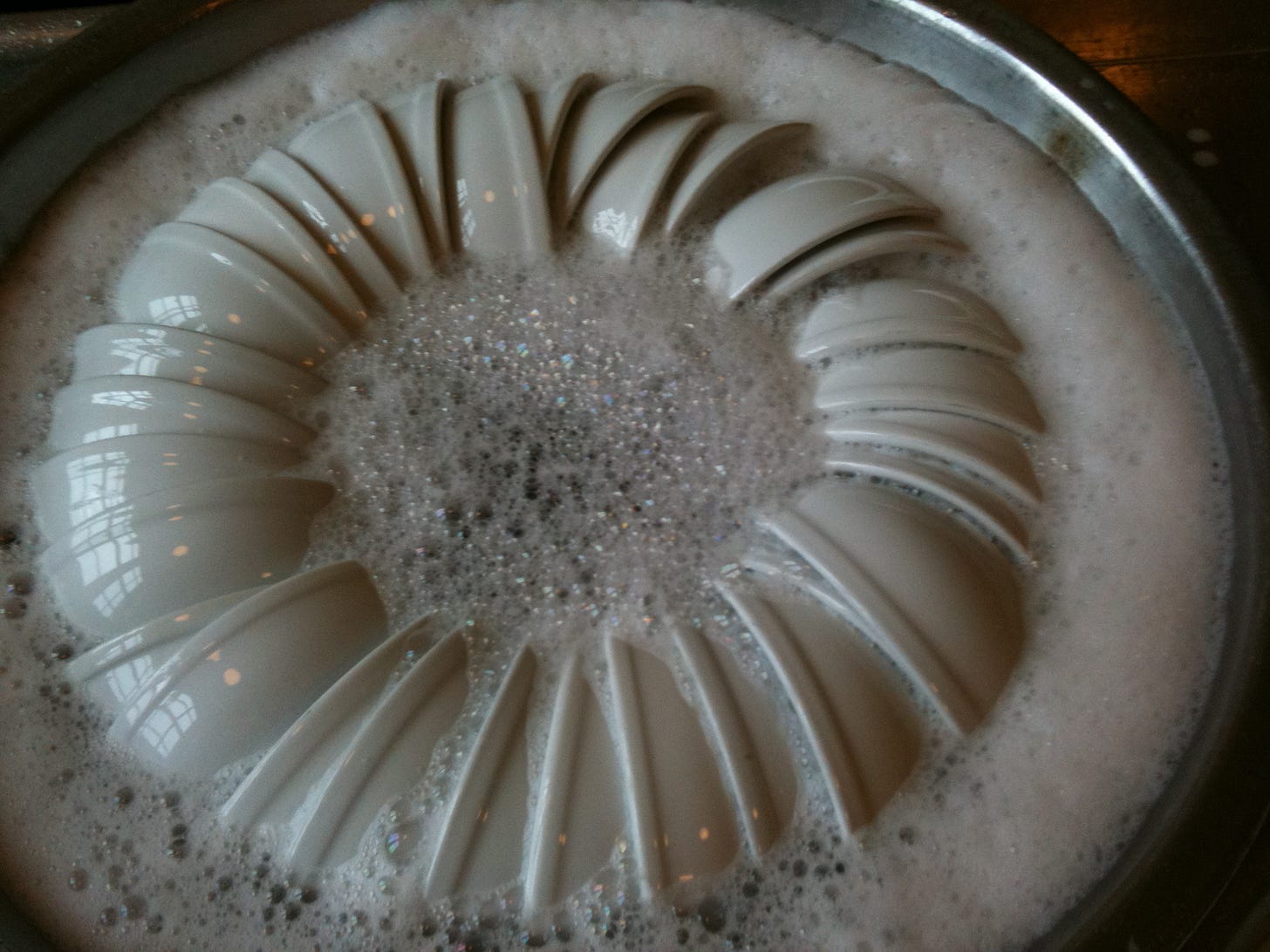[from the archive, 2011-ish]
Note, Dec. 29, 2024: I was making a fresh batch of gomasio yesterday and recalling with affection the container of gomasio on the condiment tray in the kitchen at the San Francisco Zen Center City Center, where I lived for five years. Thinking about that gomasio, (toasted sesame seeds and sea salt) and its neighboring cambro of nutritional yeast, at the end of the serving line, near the silverware trays brought me back to the feeling of what it was to pass through that kitchen several times a day, with its tall windows, its ample passageways, its swinging door with a porthole window that opened out into the beautiful Julia Morgan dining room.
Roasted on ample baking trays in the massive Wolf range, the sesame seeds emanated a perfect toasted aroma. It’s hard to remember any meal at Zen Center I didn’t sprinkle with gomasio, but rice porridge was definitely a standby. Yesterday I made a batch of rice porridge/congee—not in the huge pots of the Zen Center kitchen, but in the trusty 8 qt. Instant pot. I added shiitakes, ginger, 1/4 of an umeboshi plum, coco aminos, and of course gomasio. So simple–and especially, on a rainy morning, completely sublime.
The renovation of City Center is nearing completion and so it’s intriguing to think about how that kitchen and dining room, so etched in memory, are now in some kind of transitional state, an architectural bardo of sorts, and I’m eager to see the space in its new incarnation. You can see some photos of the renovation here.

Reflecting on the Zen Center kitchen, I remembered this piece I’d written in appreciation of a beloved member of the SFZC sangha who was devoted to the Wednesday night dish shift and I wanted to share it here.
Certain dish shifts at Zen Center are known to draw forth from their crews an especially steadfast and full-throttle action. All residents of City Center are asked to do one dish shift per week, and new residents often find themselves honored with one of these dish-intensive shifts.
Friday evening is one such shift as it involves the simple fact that at this meal, dessert is served, thereby adding one more dish per person. Also the meal itself tends to be more elaborate and this often calls for an extra bowl or two. Should you find yourself standing at the dish area with your hands in a large bowl of soapy water on this night, you will receive many sincere looks of thanks as people leave their bowl at the dish area, and go along on their way.
Sometimes the dish crew will request reinforcements. This is presaged by the striking of a set of wooden clackers, or kaishaku, otherwise used to mark the beginning of the meal chant. When this sound comes anytime after the beginning of a meal, it almost always signals the onset of one of these plaintive campaigns to swell the ranks of the dish crew. At this cue, there are a few people who uncomplicatedly rise and tie on an apron, lending their spark to the energy that comes from many people doing a small part of a big job. Others respond with a quiet deferral, a benevolent look toward the person sounding the clackers that says, I feel for you, but hey, I gotta go.
The first six months I lived at Zen Center, Friday night was my shift and one night Jordan, the Tanto, or head of Practice, added his bowl to the stack, bowed and said, It takes a special kind of bodhisattva to do dishes on Friday night. Yes, a Bodhi-sucka, I said, smiling. At this, he laughed and high-fived me, and went off into the night. But I loved it actually. It felt like home; maybe I loved the steady flow because I grew up with six siblings and many cousins and a kitchen that was always moving crowds through it. I liked finding efficient ways to handle the white ceramic bowls. And I enjoyed seeing each person as they came through. Kind of like a silent receiving line.
Eventually, for scheduling reasons, I switched to Wednesday evening, reasoning that I would be sticking around anyway for the Wednesday night dharma talk, so it would involve fewer dish-shift trades. Wednesday isn’t as heavy as Friday, but it has its own challenges, as it’s the night when people often come for dinner at City Center before the evening Dharma Talk, so there are more people in the dining room, and less time to get it all done if you want to get to the talk on time. It’s a steady effort, sometimes thinly staffed, so again, volunteers are much appreciated.
On many of these nights, I’d have been there long past 7:30 if it weren’t for the wholehearted efforts of Douglas, who often came on Wednesday evening for zazen and for the talk. Most people are finished eating by around 7 and the talk begins at 7:30, so during this interval, Douglas offered his services at the dish area.
Some people will stop by and put away a tray of bowls, and any such help is of course appreciated, but Douglas came onto the scene with complete conviction; immediately his hands plunged into the water and the stacks started disappearing into the sanitizer.
He was industrious, but also he had a finesse that I observed over many evenings watching his care as he put away the freshly washed silverware. One of my dish partners, a dish crew veteran who’d trained me, was firm in asserting that, technically, you don’t have to put the silverware into its respective baskets after it comes out of the sterilizer. It’s legitimate to leave it in the caddy that houses it in its passage through the sterilizer, she assured me, needing those few minutes to get into her robes before the talk.
It did not surprise me, however, that Douglas was intent on seeing this last detail through.
I noticed he was sorting the forks, putting some in a drawer and some in the basket, for more immediate use, and told him it was okay just to put them all in the basket. He informed me he was sorting out the new forks that had recently been purchased. Their ballast pleased him. These feel so much nicer in the hand, he said, letting one rest in his palm. I knew exactly what he meant and realized that I’d been feeling for these exact forks as I went through the line.
Dogen may have said, in the Fukanzazengi, or Instructions for Zazen, “If the least like or dislike arises, the mind is lost in confusion,” but there is no confusion here in Douglas’ discernment. In my casual survey of all the people I’ve stood behind in line, without exception, they fish for the heavier forks. Finding one, they give it an appreciative reckoning.
And when people don’t have to suffer the comparatively flimsy cutlery, they can thank Douglas.








I always tried to do the cooking rather than the dishes until I read this https://plumvillage.org/articles/memories-from-the-root-temple-washing-dishes and recognized the pleasure of the warm water and having the gift a time to be grateful for the meal. I loved reading this.